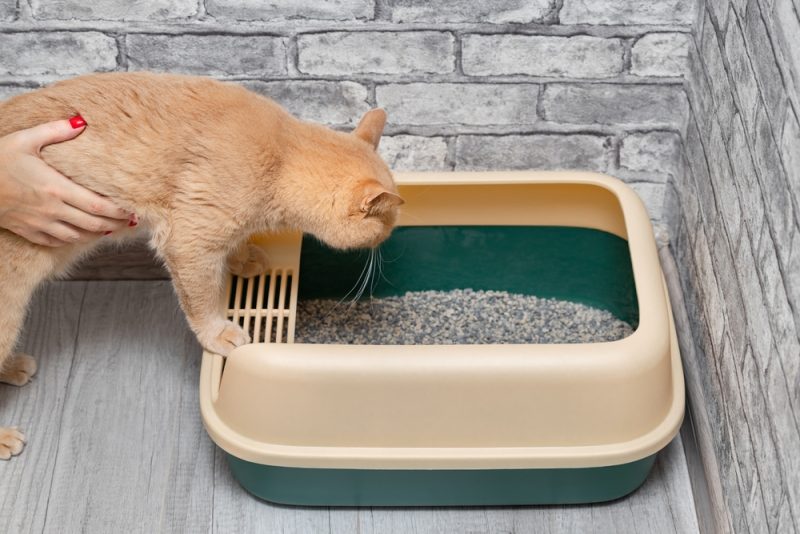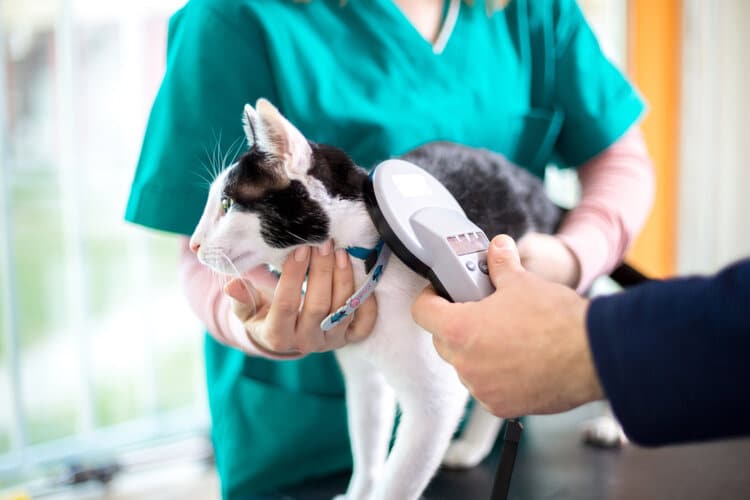Feline oral squamous cell carcinoma is an invasive type of cancer. Affected cats tend to have pain associated with the tumor and may be disinclined to eat. Let’s look at some signs of squamous cell carcinoma and what treatment options might be available for your cat.

What Is Feline Oral Squamous Cell Carcinoma?
Feline oral squamous cell carcinoma is a malignant cancer that tends to be locally invasive. It typically starts in the tissues of your cat’s mouth, but it can spread further, even into the bone. Common areas where squamous cell carcinoma occurs are the gums and palate.
This cancer is the most commonly diagnosed oral cancer in cats. It may be found incidentally during a routine exam or dental cleaning. Squamous cell carcinoma can spread to other areas of the body, such as the lymph nodes and lungs. If your veterinarian suspects squamous cell carcinoma, they should palpate your cat’s lymph nodes and take radiographs (X-rays) of the cat’s chest to look for metastasis.
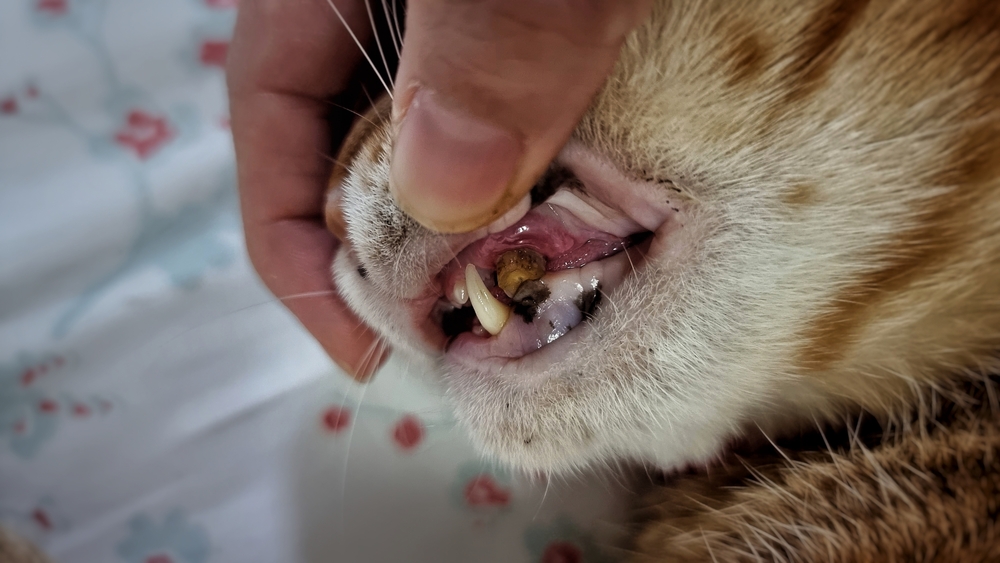
What Are the Signs of Feline Oral Squamous Cell Carcinoma?
Cats with an oral tumor often develop trouble eating. The tumor can cause pain, but it can also interfere with your cat’s ability to chew. You might see your cat go to the food bowl but refuse to eat.
Signs you might see at home with oral squamous cell carcinoma in cats include:
- Difficulty eating
- Reluctance to eat
- Dropping food out of their mouths
- Facial swelling or deformity
- Drooling, especially if it’s on one side of the mouth
- Blood-tinged saliva
- Pawing at the face
- Severe halitosis
- Weight loss
If you are concerned about the health and well-being of your pet, we recommend getting in touch with a vet for guidance.
If you need to speak with a vet but can't get to one, head over to PangoVet. It's an online service where you can talk to a vet online and get the advice you need for your pet — all at an affordable price!

What Are the Causes of Feline Oral Squamous Cell Carcinoma?
Squamous cell carcinoma may also appear in other areas of your cat, such as around its ears or nose. In these cases, it is likely caused by sun damage or exposure to UV rays, but trauma could also be a cause.
Sun exposure is less likely to be a cause for cats with oral squamous cell carcinoma. These cats are likely affected by chronic inflammation caused by severe periodontal disease.

Diagnosing Feline Oral Squamous Cell Carcinoma in Your Cat
Your cat should receive a physical exam at least one to two times per year to check for physical abnormalities, but you should also strongly consider annual dental cleanings under anesthesia. Your veterinarian will use this time to check your cat’s mouth thoroughly. At the same time, it is asleep under anesthesia, infusing the back of its mouth and under its tongue.
If your veterinarian sees a suspicious lesion in your cat’s mouth, they’ll likely recommend a fine needle aspirate for cytology or a biopsy. Options include:
- Fine needle aspirate is the least invasive method for obtaining cells for examination under the microscope. However, it is also more likely to lead to a missed diagnosis.
- Incisional biopsy means your vet will take a small piece of the lesion and submit it to a pathologist for review.
- An excisional biopsy involves surgery to remove the whole mass and submit it for evaluation.
Your veterinarian might start with blood work and radiographs (X-rays). Blood work typically checks your cat’s red blood cell levels (to ensure he’s not anemic), kidney enzymes, and blood sugar levels. Radiographs are helpful to check for metastasis to the lungs or abdomen. Unfortunately, a CT scan is usually needed to determine how invasive the mass is, giving your veterinarian an idea of whether surgery might be possible.
 How Do I Care for a Cat With Feline Oral Squamous Cell Carcinoma
How Do I Care for a Cat With Feline Oral Squamous Cell Carcinoma
If your cat is diagnosed with oral squamous cell carcinoma, your veterinarian might refer it to a surgical specialist. Some referral hospitals have surgeons and oncologists working closely to treat these pets.
Surgery
Surgery may be an option for your cat and is often the first-line recommended treatment option. If the mass is small, the entire area may be removed, but sometimes veterinarians settle for debulking as much of the mass as possible. Your veterinarian may resect some underlying tissue or bone if the tumor has invaded local tissues. The vet will likely also sample the nearby or draining lymph nodes to help the pet better understand the possible spread.
Post-operative care for cats after major oral surgery can be intensive. Your cat may need a feeding tube placed, which could be a temporary or permanent fixture in your cat’s care.
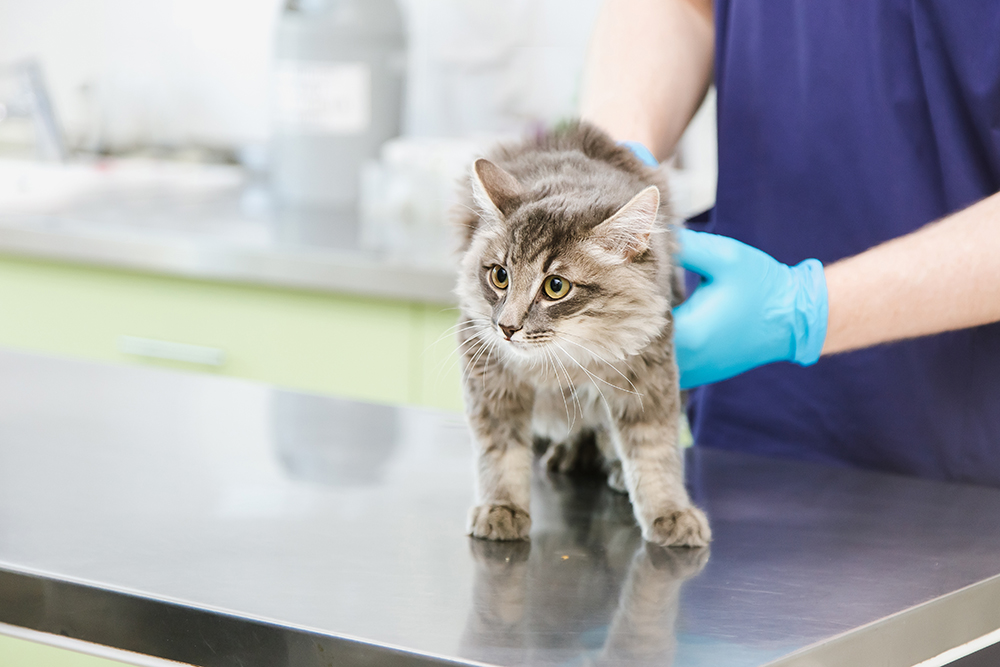
Radiation
Radiation therapy may yield better long-term results than simply removing the mass, mainly if it is found early and when the squamous cell carcinoma is small. Veterinary oncologists may utilize radiation treatments to shrink the mass or to delay tumor growth.
Palliative Treatments
If other treatments are not feasible, either due to expense, location, or compromising your cat’s remaining quality of life, your veterinarian will likely recommend palliative care or hospice care.
Palliative care treats your cat’s underlying discomfort with pain medications or anti-inflammatories such as Onsior (robenacoxib). Radiation therapy is sometimes used as a form of palliative care to try and stabilize the tumor’s size.
Some squamous cell carcinoma cases become badly ulcerated and infected. In these cases, your vet might prescribe an antibiotic medication.
If your cat has trouble eating, your vet may place a feeding tube to allow it to be syringe-fed.
 Frequently Asked Questions (FAQ)
Frequently Asked Questions (FAQ)
What is the prognosis for a cat with squamous cell carcinoma?
The prognosis for a cat with squamous cell carcinoma is relatively poor. North Carolina State University College of Veterinary Medicine estimates that less than 10% of cats diagnosed with squamous cell carcinoma live past a year.
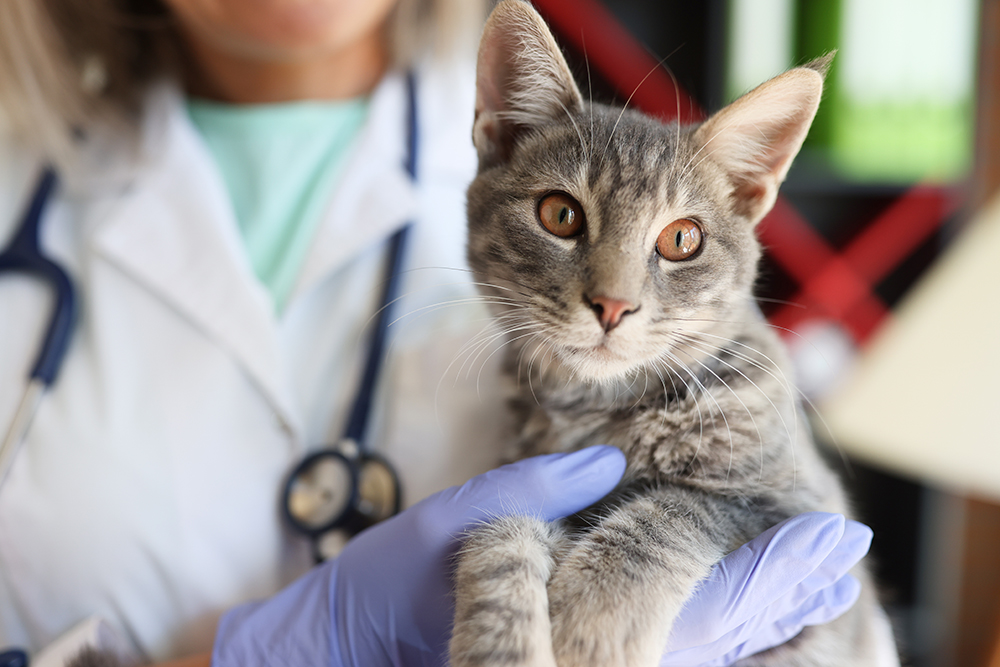
Can squamous cell carcinoma occur in areas of the body other than the mouth?
Squamous cell carcinoma can develop in your cat’s body other than in their mouth. It often occurs in places like your cat’s ears or on your cat’s face and is more common in areas that may be exposed to a lot of UV light.
 Conclusion
Conclusion
Squamous cell carcinoma is a scary diagnosis for our feline family members. While there are several treatment options, often, the location of the cancer limits how viable surgery or radiation can be. Your veterinarian will help you develop a treatment plan to keep your cat comfortable as long as possible.
Featured Image Credit: MeowDr, Shutterstock

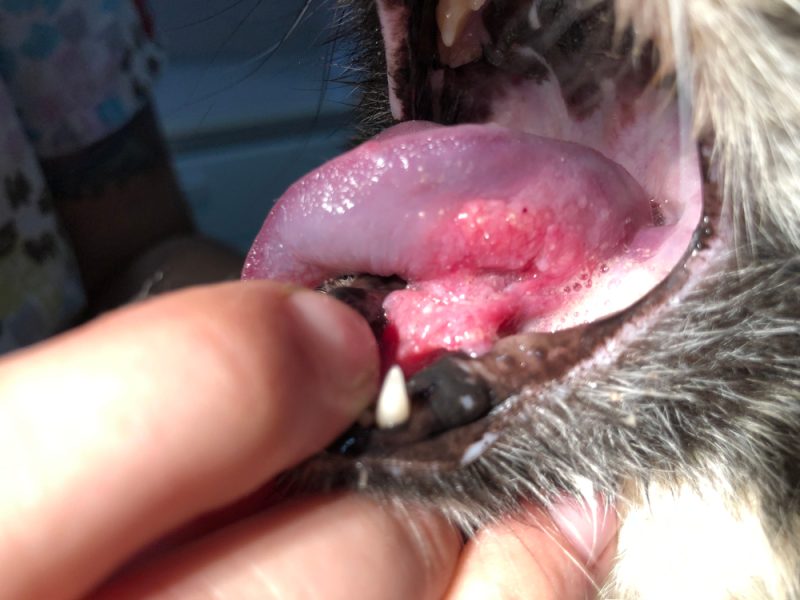
 How Do I Care for a Cat With Feline Oral Squamous Cell Carcinoma
How Do I Care for a Cat With Feline Oral Squamous Cell Carcinoma

